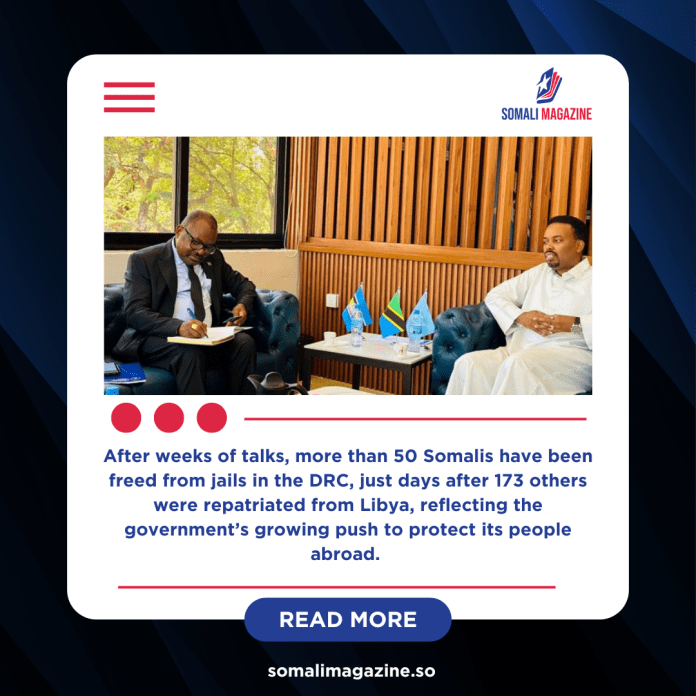Facebook Twitter (X) Instagram Somali Magazine - People's Magazine
More than 50 Somali citizens imprisoned in the Democratic Republic of Congo (DRC) have been released following talks between Somali and Congolese authorities. Officials confirmed the development, describing it as a major step in Somalia’s efforts to bring its people back home from foreign jails.
The detainees had been held in different prisons, including the city of Lubumbashi. Although the release freed over 50 people, many more Somalis are still serving sentences in the DRC. The Somali government, however, says it remains committed to working with local leaders in Congo to secure the freedom of those still behind bars.
Somalia’s Ambassador to Tanzania and the DRC, Ilyas Ali Hassan, announced the news, saying the release came after direct diplomatic engagement. “All Somalis who were detained in various ways in the Congo DRC, especially in the city of Lubumbashi, have been released, numbering over 50 people, after we discussed with the Congolese government leaders,” Ambassador Hassan said.
The move reflects a growing campaign by the Somali government to support citizens trapped abroad in difficult conditions. It comes only a week after Somalia repatriated 173 nationals from prisons in Libya, where they had been living under harsh and inhumane circumstances. The Libya operation brought back people who had endured years in detention, with many describing overcrowding, neglect, lack of medical care, and even torture.
A plane carrying 151 returnees from Libya landed in Mogadishu, while another 22 landed in Hargeisa. Most of them were young Somalis who had left home hoping to migrate to Europe through North Africa but ended up trapped in Libya’s detention centers. Their stories reflect the risks and dangers of irregular migration, which often exposes vulnerable young people to abuse, exploitation, and suffering far from home.
The Somali government says it has made the welfare of its citizens abroad a priority. Over the past year, it has intensified efforts to track and assist nationals facing imprisonment, abuse, or displacement in different countries. Officials argue that this work is not only about freeing people from prisons but also about showing solidarity with citizens who have found themselves caught in difficult and sometimes life-threatening situations while seeking better opportunities.
Diplomats point out that the problem is much bigger than the numbers recently repatriated. Hundreds of Somalis remain detained in countries across Africa and the Middle East. Many of them are held for immigration-related offenses, while others are victims of human trafficking networks that exploit migrants trying to cross borders illegally.
Despite these challenges, the recent releases in both the DRC and Libya show that Somalia is making progress in bringing people home. For families waiting anxiously in Mogadishu, Hargeisa, and other towns across the country, these efforts mean reunification with loved ones and an end to years of uncertainty.
The Somali government has also used these developments to remind citizens about the dangers of unsafe migration routes. Officials continue to urge young people not to risk their lives in search of uncertain futures abroad, pointing to the suffering of those who end up imprisoned or stranded in foreign lands. Instead, they say, Somalia is working on creating opportunities at home that can reduce the desperation driving migration in the first place.
For now, the release of more than 50 people from Congolese prisons has been welcomed as a victory for Somali diplomacy and a relief for the families of those freed. Together with the large-scale repatriation from Libya, it highlights how determined the Somali government has become in responding to the plight of its citizens abroad. While challenges remain, these actions mark an important step in protecting the dignity and rights of Somali nationals, no matter where they are.

